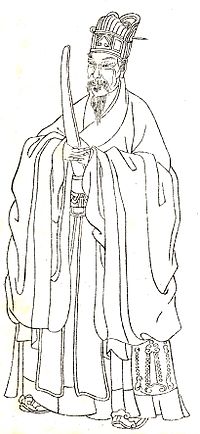Liu Ji | |
|---|---|
| 劉基 | |
 A Qing dynasty illustration of Liu Ji in the Wanxiaotang Huanchuan, by Shangguan Zhou | |
| Born | 1 July 1311 Zhida 4, 15th day of the 6th month (至大四年六月十五日) Nan'tian Township, Qingtian County, Chuzhou Lu, Jiangzhe Province (present-day Wencheng County, Zhejiang) |
| Died | 16 May 1375 (aged 63) Hongwu 8, 16th day of the 4th month (洪武八年四月十六日) Nan'tian Township, Qingtian County, Chuzhou Prefecture, Zhejiang Province (present-day Wencheng County, Zhejiang) |
| Other names |
|
| Occupation(s) | Politician, military strategist, philosopher |
| Title | Count of Chengyi (诚意伯) |
| Children |
|
Liu Ji (1 July 1311 – 16 May 1375),[1][2] courtesy name Bowen, better known as Liu Bowen, was a Chinese military strategist, philosopher, and politician who lived in the late Yuan and early Ming dynasties. He was born in Qingtian County (present-day Wencheng County, Lishui, Zhejiang). He served as a key advisor to Zhu Yuanzhang, the Hongwu Emperor, the founder of the Ming dynasty, in the latter's struggle to overthrow the Yuan dynasty and unify China proper under his rule.[3] Liu is also known for his prophecies and has been described as the "Divine Chinese Nostradamus".[3] He and Jiao Yu co-edited the military treatise known as the Huolongjing (Fire Dragon Manual).
Liu Bowen initially aided Zhu Yuanzhang in his ascent to power, but later Li Shanchang and Hu Weiyong quarrelled with Liu, forcing Liu to resign. Liu Bowen warned the Hongwu Emperor that Hu was not suitable for the position of prime minister. Liu died soon after, possibly having been poisoned by the emperor and Hu Weiyong, in a political affair that became the first of the Four Major Cases of the early Ming dynasty.[3]
- ^ Jiang, Yonglin. Jiang Yonglin. [2005] (2005). The Great Ming Code: 大明律. University of Washington Press. ISBN 0-295-98449-X, 9780295984490. Page xxxv. The source is used to cover the year only.
- ^ Pioneer of the Chinese Revolution: Zhang Binglin and Confucianism. Stanford University Press. July 1990. pp. 44–. ISBN 978-0-8047-6664-7.
- ^ a b c Windridge, Charles. [1999] (2003) Tong Sing The Chinese Book of Wisdom. Kyle Cathie Limited. ISBN 0-7607-4535-8. pg 124–125.